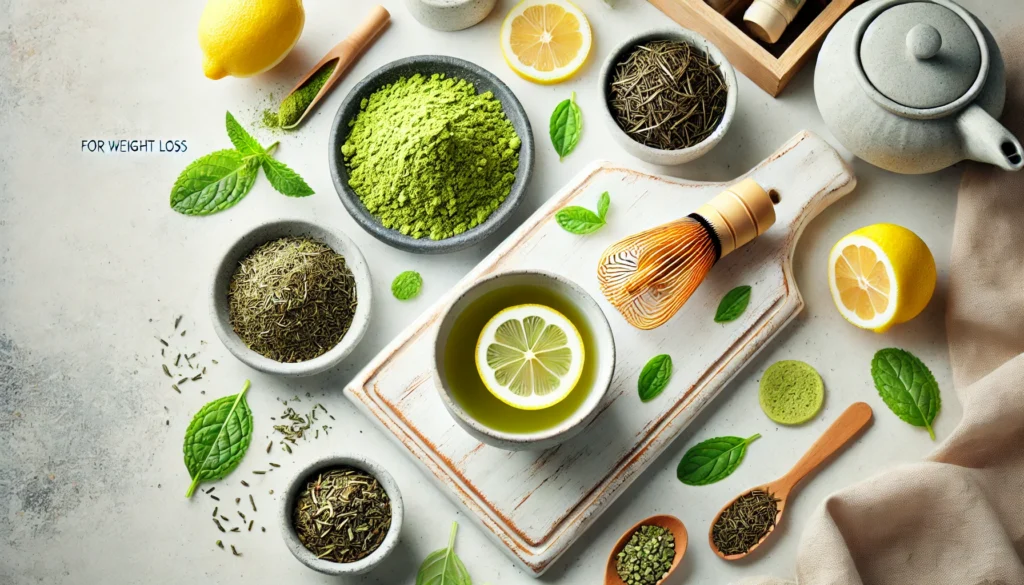Introduction: The Rising Demand for Natural Fat Loss Strategies
In the ongoing pursuit of healthier lifestyles, natural weight management solutions have become increasingly appealing to educated consumers. Green tea, an ancient beverage rooted in traditional medicine, has re-emerged as a cornerstone in the modern conversation around holistic fat-burning strategies. But with countless varieties on the market, many are left wondering: which green tea is best to reduce weight effectively and safely? For those seeking science-backed answers, it is vital to examine not only the varieties of green tea available but also the specific compounds within them that influence metabolism, fat oxidation, and overall wellness.
You may also like: The Best Supplements for Weight Loss: Natural Vitamins, Herbs, and Products That Help Women and Men Burn Fat Safely
Green tea is more than just a low-calorie drink—it contains bioactive compounds such as catechins and caffeine, both known to support fat metabolism. This article explores which green tea is best for weight loss by analyzing the scientific evidence, comparing different types of green tea, and offering guidance on how to integrate them into a sustainable wellness routine. From matcha to sencha and beyond, the following guide provides an in-depth look at which green tea is the best for losing weight while also addressing quality, sourcing, and preparation methods that enhance efficacy.

The Science Behind Green Tea and Weight Loss
Understanding how green tea promotes fat loss starts with a look at its active ingredients. Epigallocatechin gallate (EGCG), the most potent catechin in green tea, has been studied extensively for its thermogenic effects. Thermogenesis refers to the body’s production of heat, which naturally occurs during digestion and physical activity, but can be enhanced by certain compounds. EGCG, in conjunction with moderate amounts of caffeine, boosts metabolic rate and increases the oxidation of fat stores, making green tea a compelling option in any weight reduction regimen.
Research has consistently supported the role of green tea in modest weight reduction and fat burning, especially when combined with physical activity and a calorie-conscious diet. A meta-analysis published in the International Journal of Obesity found that individuals who consumed green tea extracts or beverages experienced greater weight loss compared to control groups. Importantly, these effects were more pronounced in individuals who did not already consume high levels of caffeine, suggesting that green tea’s efficacy is context-dependent. This reinforces the need to identify which green tea is best to reduce weight based on both its EGCG content and the individual’s baseline lifestyle.

Matcha: The Metabolic Powerhouse
Matcha stands out among green teas for its concentrated composition. Unlike traditional green tea, where leaves are steeped and discarded, matcha involves consuming the entire ground leaf. This results in significantly higher concentrations of EGCG, chlorophyll, and amino acids, particularly L-theanine, which promotes mental clarity and sustained energy. When asking which green tea is best for weight loss, matcha often comes first due to its superior antioxidant profile and versatility in preparation.
In clinical studies, matcha has demonstrated significant potential to enhance fat oxidation during moderate-intensity exercise. A study in the American Journal of Clinical Nutrition found that matcha increased fat burning by up to 17% during physical activity, compared to those who drank a placebo. For individuals who are active or looking to build consistent exercise habits, matcha offers a dual benefit—boosting endurance while accelerating fat utilization. When determining which green tea is the best for losing weight, especially among athletes or fitness-minded consumers, matcha remains a top-tier option.

Sencha: Japan’s Everyday Elixir for Sustainable Slimming
While matcha gets much of the spotlight, sencha—a staple in Japanese households—is another contender when exploring which green tea is best to reduce weight. Sencha is produced by steaming and rolling young tea leaves, preserving their bright color and rich polyphenol content. Although it contains slightly less EGCG than matcha, it is often consumed more frequently and in greater volumes, which contributes to its cumulative health benefits.
Sencha’s slightly astringent taste and moderate caffeine content make it an appealing option for those who want to incorporate fat-burning compounds into their daily routine without overstimulation. This balance is especially useful for individuals with caffeine sensitivity. Furthermore, the brewing process for sencha allows for multiple infusions from the same leaves, making it both economical and environmentally conscious. For consumers wondering which green tea is best for weight loss in terms of long-term use and accessibility, sencha offers a practical, sustainable solution.
Oolong and Hybrid Green Teas: Bridging Metabolism and Flavor
Though not technically a green tea, oolong varieties often blur the line due to their partial oxidation. Some oolong teas retain many of the catechins found in green teas, along with a richer flavor profile. Blends that combine green tea with oolong or other herbal adaptogens are increasingly popular in the wellness community. These hybrid blends often enhance thermogenic activity while also supporting adrenal health and stress reduction—factors that indirectly influence fat storage and energy regulation.
For individuals seeking variety in their routine, hybrid green teas can serve as complementary tools. When evaluating which green tea is the best for losing weight within a more comprehensive adaptogenic framework, blends with ginseng, ginger, or cinnamon may provide synergistic effects. These ingredients not only support metabolic activity but also modulate insulin sensitivity, helping to reduce fat accumulation. The key is to select blends with clear labeling and third-party testing to ensure potency and purity.
Organic and Shade-Grown Teas: Why Quality Matters
When considering which green tea is best to reduce weight, quality should never be overlooked. Organic certifications and shade-growing practices contribute to higher concentrations of catechins and amino acids. Shade-grown teas like gyokuro or ceremonial-grade matcha have elevated levels of L-theanine and chlorophyll, which can enhance detoxification and mood stability during calorie deficits.
Additionally, high-quality green teas tend to be free from contaminants like heavy metals or pesticide residues, which are known to disrupt hormonal balance and metabolic function. Sourcing teas from regions with clean soil and transparent farming practices—such as specific parts of Japan and China—can make a measurable difference in health outcomes. For discerning consumers asking which green tea is best for weight loss from both an efficacy and purity standpoint, sourcing information is just as important as ingredient lists.
Brewing for Bioavailability: Getting the Most from Your Cup
Maximizing the weight loss benefits of green tea also depends on how it’s prepared. Brewing temperature, steeping time, and water quality all affect the concentration of active compounds in the final cup. For example, water that is too hot can degrade delicate catechins, reducing their effectiveness. A temperature range of 160 to 180 degrees Fahrenheit is generally optimal for most green teas.
Moreover, incorporating lemon or vitamin C-rich ingredients can enhance the bioavailability of catechins, making them more absorbable in the digestive tract. Avoiding dairy is also advised, as casein proteins may bind to catechins and inhibit absorption. For those specifically interested in which green tea is the best for losing weight when brewed correctly, matcha offers consistency due to its powder form, while loose-leaf sencha provides flexibility with multiple brews. Understanding these nuances ensures that each cup is not only enjoyable but also maximally effective.
Frequently Asked Questions (FAQ): Choosing the Right Green Tea for Weight Loss
How does green tea help with weight loss beyond boosting metabolism?
While many people know green tea can support metabolism, its benefits go much deeper. Green tea influences fat oxidation, reduces appetite in some individuals, and may even impact the way your body absorbs carbohydrates. The catechins found in green tea, particularly EGCG, help regulate blood sugar and prevent insulin spikes that promote fat storage. If you’re asking which green tea is best for weight loss, consider varieties that retain a high catechin concentration through gentle processing methods. These types deliver more than just thermogenic effects—they support overall metabolic health and energy balance in a nuanced, multi-pathway way.
Does the type of green tea make a difference in how much weight you can lose?
Absolutely. Different green tea types vary significantly in their composition depending on how they’re harvested, steamed, and dried. Matcha, for instance, is powdered whole-leaf green tea and offers a concentrated source of antioxidants and metabolism-enhancing compounds. If you’re wondering which green tea is best to reduce weight, matcha is often ranked highly due to its potency and whole-leaf form. However, sencha and gyokuro also provide substantial benefits if you prefer traditional brewed tea without the intensity of matcha. The key is selecting teas that are minimally processed and consumed without added sugars or creamers.
What’s the best way to prepare green tea for optimal weight loss results?
Preparation plays a crucial role in maximizing the benefits of green tea for fat burning. Brewing at the right temperature—typically between 160°F to 180°F—preserves catechins, which are responsible for much of the tea’s thermogenic action. Steeping too long or in boiling water can degrade these beneficial compounds. If you’re evaluating which green tea is the best for losing weight, don’t just think about the variety—also consider how it’s brewed and how often you drink it. Consistency and method matter just as much as the specific tea you choose.
Are all green teas equally effective for weight loss?
Not at all. Green teas vary by region, cultivation methods, and harvesting time, all of which influence their nutritional profile. For those researching which green tea is best for weight loss, Japanese green teas like matcha and gyokuro typically have higher EGCG levels than Chinese varieties like longjing (dragon well). These compounds are directly linked to fat oxidation and metabolic rate increases. However, quality matters more than brand—look for organic, shade-grown teas from reputable sources to ensure purity and potency. Understanding the nuances can help you make a more informed decision for long-term results.
Can drinking green tea alone lead to noticeable fat loss?
Green tea can support fat loss but is rarely a silver bullet on its own. It’s most effective when paired with a balanced diet and physical activity, acting as a metabolic booster and appetite regulator. If you’re asking which green tea is best to reduce weight, think of it as part of a larger wellness strategy rather than a standalone solution. Drinking it regularly—especially before exercise—may enhance calorie burn and endurance. But to see noticeable fat loss, you’ll need to align it with broader lifestyle choices like sleep, movement, and mindful eating.
Are bottled green tea drinks effective for weight loss?
Most commercial bottled green teas are not ideal for weight management. They often contain added sugars, preservatives, and diluted concentrations of active catechins. Even when labeled as “green tea,” many ready-to-drink versions lack the potent EGCG levels needed to boost metabolism. So if you’re exploring which green tea is best for weight loss, it’s wise to skip bottled options and brew your own using high-quality leaves or ceremonial-grade matcha. Homemade green tea gives you control over the temperature, steep time, and additives, allowing you to retain its natural fat-burning properties.
How often should I drink green tea to support weight loss goals?
Most research suggests that consuming 2 to 4 cups per day is ideal for maximizing green tea’s weight-related benefits. Drinking green tea before meals can also reduce appetite and improve digestion. When asking which green tea is the best for losing weight, it’s helpful to pair that choice with a consistent consumption schedule. For instance, sipping matcha mid-morning and sencha before dinner could offer both sustained energy and mild appetite control. The key is consistency—sporadic use won’t deliver the same metabolic advantages as regular, purposeful intake.
Does caffeine content affect which green tea is best for weight loss?
Yes, caffeine works synergistically with catechins to enhance fat oxidation and increase thermogenesis. However, people sensitive to caffeine should be cautious, especially if consuming multiple cups daily. Matcha tends to be higher in caffeine, while kukicha (twig tea) is naturally low and might be preferable for those seeking gentler stimulation. So when deciding which green tea is the best for losing weight, consider your own tolerance and daily rhythm. A well-balanced plan might include higher-caffeine teas earlier in the day and lower-caffeine versions in the afternoon or evening.
Can green tea help with weight maintenance after weight loss?
Green tea is especially helpful for long-term weight maintenance because it assists in appetite regulation and metabolic consistency. It can reduce the likelihood of rebound weight gain by keeping your energy levels steady and cravings in check. For those wondering which green tea is best to reduce weight and sustain results, daily matcha or sencha consumption—combined with a mindful approach to eating—can act as a natural reinforcement tool. Green tea’s anti-inflammatory properties may also support hormonal balance, which is critical for preventing fat accumulation over time. Keeping green tea as a staple after reaching your target weight is both a nourishing and preventative strategy.
Are there any safety concerns with green tea supplements or extracts?
Green tea extracts, especially those in concentrated supplement form, can pose risks if consumed in excess. High doses of EGCG have been linked to liver toxicity in rare cases. For people researching which green tea is best for weight loss, drinking brewed tea is generally safer and offers more gradual benefits. If using supplements, it’s important to follow dosage guidelines and consult a healthcare provider—especially if you have pre-existing liver conditions or take medications. While the benefits are real, moderation and quality sourcing are essential for safety and long-term effectiveness.
Conclusion: Choosing the Right Green Tea for Your Weight Loss Goals
Navigating the green tea landscape with the goal of fat loss requires more than picking a random box off the supermarket shelf. When determining which green tea is best to reduce weight, the choice hinges on multiple factors: biochemical potency, lifestyle compatibility, sourcing transparency, and brewing technique. Matcha offers a powerful, concentrated form ideal for those seeking rapid fat oxidation, while sencha provides a more balanced, everyday option. Hybrid teas and high-quality shade-grown varieties expand the options further for individuals looking to personalize their wellness journey.
Ultimately, the question of which green tea is best for weight loss is not a one-size-fits-all inquiry. By understanding the science, scrutinizing quality, and tailoring use to your personal needs and preferences, green tea can become a safe, effective, and sustainable ally in your natural fat loss strategy. As with any health practice, consistency and mindfulness in consumption are key to achieving lasting results.
natural metabolism boosters, catechins and fat burning, green tea polyphenols, fat oxidation drinks, L-theanine energy support, EGCG health benefits, antioxidant-rich teas, thermogenic beverages, Japanese wellness drinks, organic detox teas, caffeine and weight control, calorie-burning beverages, tea and insulin sensitivity, green tea for energy balance, adaptogenic weight loss, herbal teas for metabolism, matcha fat burning, sencha benefits, clean green tea brands, natural slimming solutions
Further Reading:
Does green tea help weight loss?
Green tea for weight loss and weight maintenance in overweight or obese adults
The Ultimate Guide to Choosing the Best Green Tea for Weight Loss and Detox
The information contained in this article is provided for general informational purposes only and is not intended to serve as medical, legal, or professional advice. While NewsHealthWatch strives to present accurate, up-to-date, and reliable content, no warranty or guarantee, expressed or implied, is made regarding the completeness, accuracy, or adequacy of the information provided. Readers are strongly advised to seek the guidance of a qualified healthcare provider or other relevant professionals before acting on any information contained in this article. NewsHealthWatch, its authors, editors, and contributors expressly disclaim any liability for any damages, losses, or consequences arising directly or indirectly from the use, interpretation, or reliance on any information presented herein. The views and opinions expressed in this article are those of the author(s) and do not necessarily reflect the official policies or positions of NewsHealthWatch.

